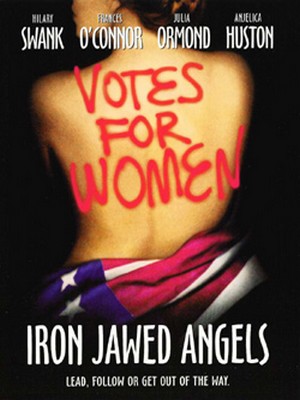
Color
Synopsis
Based on historical figures and events, Iron Jawed Angels tells the story of Alice Paul (Hilary Swank) and Lucy Burns (Frances O’Connor), two defiant young activist leaders in the American women’s suffrage movement. The two women break with the traditional suffragist movement and form a more radical faction which uses marches, civil disobedience, and eventually a hunger strike to pursue the ultimate goal of getting Congress to pass a constitutional amendment granting women the right to vote. The film begins as Alice Paul and Lucy Burns meet with the leaders of National American Woman Suffrage Association (NAWSA), including Carrie Chapman Catt (Anjelica Huston), to discuss tactics. NAWSA’s strategy is to focus on obtaining suffrage on a state-by-state basis, whereas the two younger women believe that they should be pushing for the more radical national amendment. While Alice Paul and Lucy Burns are initially allied with NAWSA, their failure to resolve the issue of tactics eventually results in their group’s breaking off from the national organization to form their own party – the National Women’s Party (NWP). Unlike NAWSA, the NWP engages in “radical” tactics that the more conservative NAWSA considers uncivilized and counterproductive to the cause. They endure harsh criticism from NAWSA and the public at large, the peak of which comes when members of the NWP decide to continue an ongoing picket of the White House after the United States declares war. This decision ultimately leads to the arrest of the suffragists on bogus charges of “obstructing traffic.” In jail, the suffragists endure harsh conditions and inhumane treatment. Inspired by Alice Paul, they begin a hunger strike in protest. Afraid of martyring Alice Paul, the jail brutally force feeds her and, after the women manage to leak this news outside of the jail, momentum builds for their movement. Ultimately, the women are successful in convincing President Woodrow Wilson to endorse women’s suffrage as a “war measure.” Thus, Congress passes the19th Amendment, allowing women to vote. Throughout the film, Alice’s ability to inspire women to act and join in the movement is highlighted. She is portrayed as a strong, commanding woman who perseveres in the face of tremendous adversity and gives up everything in pursuit of her cause. She only falters once, when her friend and fellow suffragist Inez Mulholland (Julia Ormond) dies. Believing she pushed Inez too hard, Alice blames herself and almost loses hope. At this point, Lucy Burns is able to restore her determination, and the two women fight on.A great strength of the film is its focus on the personal connections between characters and the inner struggles of Alice Paul. Thus, it turns what is usually portrayed as dry history into an engaging story. Rather than using a more traditional documentary form, von Garnier uses a compelling narrative, well-known actors, and modern music to capture the viewer’s interest. The net effect is a truly engaging film that brings the energy and excitement of a past movement to modern viewers.
Further Information
Official Website: http://www.hbo.com/films/ironjawedangels/
Links to Reviews: http://iron-jawed-angels.com/reviews.htm
IMDB Listing: http://www.imdb.com/title/tt0338139/
Swarthmore Connection: http://www.swarthmore.edu/news/history/1975.html
Books:
Adams, Katherine H, and Michael L Keene. Alice Paul and the American Suffrage Campaign. Urbana: University of Illinois Press, 2007.Irwin, Inez Haynes. Story of Alice Paul and the National Women’s Party. Fairfax: Denlingers Publishers Ltd, 1977Lunardini, Christine A.. From Equal Suffrage to Equal Rights: Alice Paul and the National Woman’s Party, 1910-1928 (American Social Experience). New York: iUniverse, 1986.
